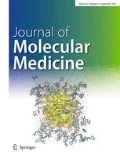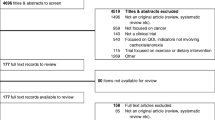Abstract
Chronic inflammation is one of the main features of cancer cachexia. Experimental and clinical studies showed that cyclooxygenase-2 inhibitors, such as celecoxib, may be beneficial in counteracting major symptoms of this devastating syndrome. We carried out a prospective phase II clinical trial to test the safety and effectiveness of an intervention with the COX-2 inhibitor celecoxib (300 mg/day for 4 months) on key variables of cachexia (lean body mass, resting energy expenditure, serum levels of proinflammatory cytokines, and fatigue) in patients with advanced cancer at different sites. A sample of 24 patients was enrolled from January to December 2008 and all were deemed assessable. A significant increase of lean body mass and a significant decrease of TNF-α were observed. Moreover, an improvement of grip strength, quality of life, performance status, and Glasgow prognostic score was shown. There were no grade 3/4 toxicities. Patient compliance was very good; no patient had to reduce the celecoxib dosage nor interrupt treatment. Our results showed that the COX-2 selective inhibitor celecoxib is an effective single agent for the treatment of cancer cachexia. Although the treatment of cancer cachexia, a multifactorial syndrome, is more likely to yield success with a multitargeted approach; in the present study, we were able to show that a treatment, such as celecoxib, addressing a single target, albeit very important as chronic inflammation, could have positive effects. Therefore, phase III clinical trials are warranted to test the efficacy and safety of celecoxib.

Similar content being viewed by others
References
Thompson MG, Palmer RM (1998) Signalling pathways regulating protein turnover in skeletal muscle. Cell Signal 10:1–11
Brennan MF (1977) Uncomplicated starvation versus cancer cachexia. Cancer Res 37:2359–2364
Bruera E (1992) Clinical management of anorexia and cachexia in patients with advanced cancer. Oncology 49(Suppl 2):35–42
Heber D, Byerley LO, Chi J, Grosvenor M, Bergman RN, Coleman M, Chlebowski RT (1986) Pathophysiology of malnutrition in the adult cancer patient. Cancer 58:1867–1873
Nelson K, Walsh D (1991) Management of the anorexia/cachexia syndrome. Cancer Bull 43:403–406
Bruera E (1997) ABC of palliative care. Anorexia, cachexia, and nutrition. Bmj 315:1219–1222
Tisdale MJ (2004) Cancer cachexia. Langenbecks Arch Surg 389:299–305
Moldawer LL, Gelin J, Schersten T, Lundholm KG (1987) Circulating interleukin 1 and tumor necrosis factor during inflammation. Am J Physiol 253:R922–R928
Strassmann G, Fong M, Kenney JS, Jacob CO (1992) Evidence for the involvement of interleukin 6 in experimental cancer cachexia. J Clin Invest 89:1681–1684
Busbridge J, Dascombe MJ, Hoopkins S (1989) Acute central effects of interleukin-6 on body temperature, thermogenesis and food intake in the rat. Proc Nutr Soc 38:48A
Gelin J, Moldawer LL, Lonnroth C, Sherry B, Chizzonite R, Lundholm K (1991) Role of endogenous tumor necrosis factor alpha and interleukin 1 for experimental tumor growth and the development of cancer cachexia. Cancer Res 51:415–421
McLaughlin CL, Rogan GJ, Tou J, Baile CA, Joy WD (1992) Food intake and body temperature responses of rats to recombinant human interleukin-1 beta and a tripeptide interleukin-1 beta antagonist. Physiol Behav 52:1155–1160
Perboni S, Inui A (2006) Anorexia in cancer: role of feeding-regulatory peptides. Philos Trans R Soc Lond B Biol Sci 361:1281–1289
Mantovani G, Maccio A, Massa E, Madeddu C (2001) Managing cancer-related anorexia/cachexia. Drugs 61:499–514
Mantovani G, Madeddu C (2008) Cyclooxygenase-2 inhibitors and antioxidants in the treatment of cachexia. Curr Opin Support Palliat Care 2:275–281
Dicker AP (2003) COX-2 inhibitors and cancer therapeutics: potential roles for inhibitors of COX-2 in combination with cytotoxic therapy: reports from a symposium held in conjunction with the Radiation Therapy Oncology Group June 2001 meeting. Am J Clin Oncol 26:S46–S47
Wang WH, Andersson M, Lonnroth C, Svanberg E, Lundholm K (2005) Prostaglandin E and prostacyclin receptor expression in tumor and host tissues from MCG 101-bearing mice: a model with prostanoid-related cachexia. Int J Cancer 115:582–590
Davis TW, Zweifel BS, O'Neal JM, Heuvelman DM, Abegg AL, Hendrich TO, Masferrer JL (2004) Inhibition of cyclooxygenase-2 by celecoxib reverses tumor-induced wasting. J Pharmacol Exp Ther 308:929–934
Seyberth HW, Segre GV, Morgan JL, Sweetman BJ, Potts JT Jr, Oates JA (1975) Prostaglandins as mediators of hypercalcemia associated with certain types of cancer. N Engl J Med 293:1278–1283
Smith KL, Tisdale MJ (1993) Mechanism of muscle protein degradation in cancer cachexia. Br J Cancer 68:314–318
Hussey HJ, Tisdale MJ (2000) Effect of the specific cyclooxygenase-2 inhibitor meloxicam on tumour growth and cachexia in a murine model. Int J Cancer 87:95–100
Saito H, Inagaki Y, Tsunenari T, Ura M, Mizuno H, Fujimoto-Ouchi K, Onuma E, Sato K, Ogata E, Yamada-Okabe H (2007) Involvement of cyclooxygenase-2 in the tumor site-dependent production of parathyroid hormone-related protein in colon 26 carcinoma. Cancer Sci 98:1563–1569
Diament MJ, Peluffo GD, Stillitani I, Cerchietti LC, Navigante A, Ranuncolo SM, Klein SM (2006) Inhibition of tumor progression and paraneoplastic syndrome development in a murine lung adenocarcinoma by medroxyprogesterone acetate and indomethacin. Cancer Invest 24:126–131
Oken MM, Creech RH, Tormey DC, Horton J, Davis TE, McFadden ET, Carbone PP (1982) Toxicity and response criteria of the eastern cooperative oncology group. Am J Clin Oncol 5:649–655
Mantovani G, Maccio A, Madeddu C, Gramignano G, Lusso MR, Serpe R, Massa E, Astara G, Deiana L (2006) A phase II study with antioxidants, both in the diet and supplemented, pharmaconutritional support, progestagen, and anti-cyclooxygenase-2 showing efficacy and safety in patients with cancer-related anorexia/cachexia and oxidative stress. Cancer Epidemiol Biomarkers Prev 15:1030–1034
Cerchietti LC, Navigante AH, Peluffo GD, Diament MJ, Stillitani I, Klein SA, Cabalar ME (2004) Effects of celecoxib, medroxyprogesterone, and dietary intervention on systemic syndromes in patients with advanced lung adenocarcinoma: a pilot study. J Pain Symptom Manage 27:85–95
Lai V, George J, Richey L, Kim HJ, Cannon T, Shores C, Couch M (2008) Results of a pilot study of the effects of celecoxib on cancer cachexia in patients with cancer of the head, neck, and gastrointestinal tract. Head Neck 30:67–74
Stein KD, Martin SC, Hann DM, Jacobsen PB (1998) A multidimensional measure of fatigue for use with cancer patients. Cancer Pract 6:143–152
Prue G, Rankin J, Cramp F, Allen J, Gracey J (2006) Fatigue in gynaecological cancer patients: a pilot study. Support Care Cancer 14:78–83
Mantovani G, Madeddu C, Maccio A, Gramignano G, Lusso MR, Massa E, Astara G, Serpe R (2004) Cancer-related anorexia/cachexia syndrome and oxidative stress: an innovative approach beyond current treatment. Cancer Epidemiol Biomarkers Prev 13:1651–1659
Crumley AB, McMillan DC, McKernan M, McDonald AC, Stuart RC (2006) Evaluation of an inflammation-based prognostic score in patients with inoperable gastro-oesophageal cancer. Br J Cancer 94:637–641
NIH guide. Cachexia: research into biobehaviorial management and quality of life. June 11, 2001.
Therasse P, Arbuck SG, Eisenhauer EA, Wanders J, Kaplan RS, Rubinstein L, Verweij J, Van Glabbeke M, van Oosterom AT, Christian MC et al (2000) New guidelines to evaluate the response to treatment in solid tumors. European organization for research and treatment of cancer, national cancer institute of the United States, national cancer institute of Canada. J Natl Cancer Inst 92:205–216
National Cancer Institute-Cancer Therapy Evaluation Program: common terminology criteria for adverse events v3.0 (CTCAE), August 9, 2006
Funakoshi-Tago M, Shimizu T, Tago K, Nakamura M, Itoh H, Sonoda Y, Kasahara T (2008) Celecoxib potently inhibits TNFalpha-induced nuclear translocation and activation of NF-kappaB. Biochem Pharmacol 76:662–671
Baumgarten AJ, Fiebig HH, Burger AM (2007) Molecular analysis of xenograft models of human cancer cachexia—possibilities for therapeutic intervention. Cancer Genomics Proteomics 4:223–231
Lundholm K, Daneryd P, Korner U, Hyltander A, Bosaeus I (2004) Evidence that long-term COX-treatment improves energy homeostasis and body composition in cancer patients with progressive cachexia. Int J Oncol 24:505–512
McMillan DC, Wigmore SJ, Fearon KC, O'Gorman P, Wright CE, McArdle CS (1999) A prospective randomized study of megestrol acetate and ibuprofen in gastrointestinal cancer patients with weight loss. Br J Cancer 79:495–500
Cerchietti LC, Navigante AH, Castro MA (2007) Effects of eicosapentaenoic and docosahexaenoic n-3 fatty acids from fish oil and preferential Cox-2 inhibition on systemic syndromes in patients with advanced lung cancer. Nutr Cancer 59:14–20
Motsko SP, Rascati KL, Busti AJ, Wilson JP, Barner JC, Lawson KA, Worchel J (2006) Temporal relationship between use of NSAIDs, including selective COX-2 inhibitors, and cardiovascular risk. Drug Saf 29:621–632
Mantovani G, Maccio A, Madeddu C, Gramignano G, Serpe R, Massa E, Dessi M, Tanca FM, Sanna E, Deiana L et al (2008) Randomized phase III clinical trial of five different arms of treatment for patients with cancer cachexia: interim results. Nutrition 24:305–313
Acknowledgment
The authors take full responsibility for the content of the paper but thank Ms. Anna Rita Succa for her assistance in editing the article.
Disclosure statement
The authors have no financial or personal relationships with other people or organizations that could inappropriately influence their work.
Author information
Authors and Affiliations
Corresponding author
Rights and permissions
About this article
Cite this article
Mantovani, G., Macciò, A., Madeddu, C. et al. Phase II nonrandomized study of the efficacy and safety of COX-2 inhibitor celecoxib on patients with cancer cachexia. J Mol Med 88, 85–92 (2010). https://doi.org/10.1007/s00109-009-0547-z
Received:
Revised:
Accepted:
Published:
Issue Date:
DOI: https://doi.org/10.1007/s00109-009-0547-z




